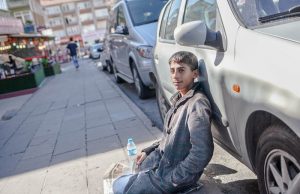Local Communities Experiences of Displacement from Syria: Views from Lebanon, Jordan and Turkey
By Dr Elena Fiddian-Qasmiyeh (Reader in Human Geography and Co-Director of the Migration Research Unit, University College London), Alastair Ager (Director of the Institute for Global Health and Development, Queen Margaret University, Edinburgh), Dr Anna Rowlands (Lecturer in Contemporary Catholic Theology and Deputy Director of the Centre for Catholic Studies, Durham University) and Lyndsey Stonebridge (Professor of Modern Literature and History University of East Anglia)
Over 4,4 million refugees have sought safety across Lebanon, Jordan and Turkey from the on-going Syrian conflict, with local communities, civil society groups, established refugee communities, and faith-based organisations providing essential assistance, solidarity and support to refugees. However, little is known regarding the motivations, nature and impacts of such responses to international refugee flows from conflict. Our PaCCS project aims to improve our understanding of the challenges and opportunities that arise in local responses to displacement, both for refugees from Syria and for the members of the communities that are hosting them in Lebanon, Jordan and Turkey.
Working closely with local researchers throughout all stages of the project, the team will complete in-depth ethnographic research with nine local communities across Lebanon, Jordan and Turkey to observe how the members of these communities have experienced and responded to the arrival of refugees from Syria. Through a total of over 500 interviews and 30 participatory research workshops with local community members and refugees, the project will examine their experiences of providing, seeking, receiving and being excluded from different forms of support. The influences of gender, political opinion, ethnicity and religious identity on these processes will be a particular focus. In turn, interviews with over 100 people who work with local, national and international organisations (including UN agencies) will examine their views of local responses to refugees from Syria. This will help the team identify the extent of national and international support for local community responses for refugees.
The obligation to fit the ‘humanitarian narrative’ frequently results in the silencing of refugee experiences and the framing of refugees as suffering victims; this has long acted as a barrier to understanding refugee communities and their perceptions of diverse encounters. To challenge these assumptions, creative writing workshops with refugees and local communities will offer a critical space for participants to simultaneously document, trace and resist experiences of and responses to displacement. In addition to reflecting on their own journeys and personal encounters, participants will also explore how their stories connect – in time, style and motif – with those of others, from the present and the past. By presenting these connected stories to a wide range of audiences in the Middle East and the UK, the project aims to challenge the image of the individual suffering refugee with evidence of the creative resistance and resilience of different communities and traditions of refugees and hosts.
This project will reframe debates about the roles and experiences of local communities and refugees in contexts of conflict-induced displacement in the global South. Through an interdisciplinary, participatory research approach, the researchers will develop a more nuanced understanding of the challenges and opportunities that arise when local communities engage in activities designed to enhance the quality of life of displaced populations. In so doing, the research aims to inform the development of policy, practice and service provision at local, national and international levels.
Meeting these aims will be significantly assisted by working closely with a range of project partners and collaborators that include: the Joint Learning Initiative on Faith and Local Communities (whose members include Islamic Relief, OXFAM and UNHCR); English-PEN and PEN-International; and Prof. Dame Marina Warner’s mobile storytelling initiative, Stories in Transit.
Follow our project updates on www.refugeehosts.org and @RefugeeHosts
—
Dr Elena Fiddian-Qasmiyeh is Reader in Human Geography and Co-Director of the Migration Research Unit at University College London (UCL), where she is also the Coordinator of the UCL-wide Refuge in a Moving World interdisciplinary research network (@RefugeMvingWrld). Her recent publications include The Ideal Refugees: Gender, Islam and the Sahrawi Politics of Survival (Syracuse University Press, 2014), South-South Educational Migration, Humanitarianism and Development: Views from the Caribbean, North Africa and the Middle East (Routledge, 2015) and The Oxford Handbook of Refugee and Forced Migration Studies (co-editor, Oxford University Press, 2014).
Dr Alastair Ager is Director of the Institute for Global Health and Development, Queen Margaret University, Edinburgh. He is active in five major areas of research: the engagement of local faith communities in humanitarian response; the evaluation of humanitarian programming; health systems resilience in crisis situations; the well-being of humanitarian workers; and health research capacity strengthening. He is author of over one hundred scholarly publications, and the recent book Faith, Secularism and Humanitarian Engagement (Palgrave, 2015), co-authored with his son, Joey Ager.
Dr Anna Rowlands is Lecturer in Contemporary Catholic Theology and Deputy Director of the Centre for Catholic Studies, Durham University. She is a Political Theologian with a background in the social sciences as well as theology. She has worked in the area of theological ethics and human migration for nearly a decade, working in particular on questions of European policy, immigration detention and narratives of the good. Her interests lie at the intersection of theological metaphysics and ethics, political theory, the practice of the church and the practice of politics.
Prof Lyndsey Stonebridge is Professor of Modern Literature at History at the University of East Anglia, where she directs the Humanities and Human Rights Project. Her research focuses on twentieth-century and contemporary literature and history, Human Rights and Refugee Studies. She has written on war, trauma, human rights, refugee studies and psychoanalysis. Her books include: The Judicial Imagination: Writing after Nuremberg (2011), The Destructive Element (1998) and The Writing of Anxiety (2007). Her new book, Placeless People: Rights, Writing and Refugees will be published in 2017. She is the co-editor of the website, Refugeehistory.org.




